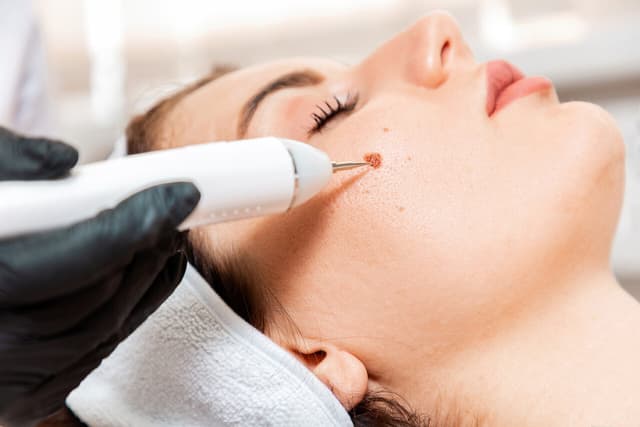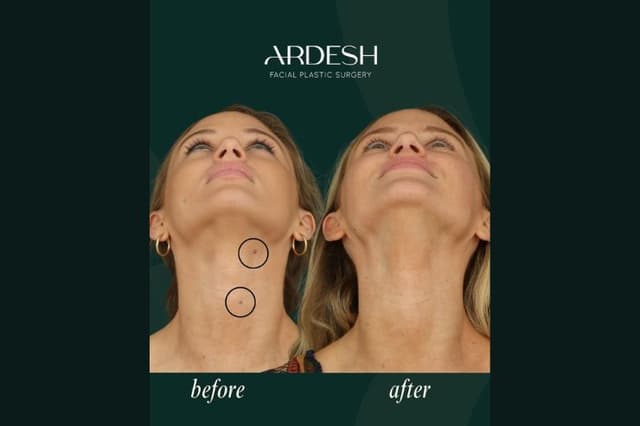If you have a raised mole, beauty mark removal, or flat moles, you may have considered mole removal. Whether for cosmetic reasons or health concerns, these pesky moles and skin tags can be removed using various methods. Fortunately, Dr. Ardesh can answer any questions you may have about removing raised moles, beauty marks, or flat moles. We’ll delve into the different mole removal surgery procedures, as well as how to identify different types of raised moles and flat moles.
The Types Of Raised Moles
Before any professional considers removing moles, they must first examine the nature of said mole. After all, raised moles come in many shapes and sizes, with some having more concerning characteristics than others. Here are the most common types of raised moles:
- Benign Moles: Typically harmless and non-cancerous, these moles pose no immediate threat to your health and can easily undergo cosmetic mole removal.
- Atypical Moles: Also known as dysplastic nevi, atypical moles have irregular shapes and may resemble melanoma. While often benign, they should be monitored closely or removed when necessary.
- Cancerous Moles: These moles harbor melanoma, a type of skin cancer that can develop within the mole tissue and surrounding skin. Regular mole checks and prompt mole removal are vital.
Removing a Raised Mole: Mole Removal Procedures
If you want to remove moles on your body, a mole removal procedure is the best way to do so. More effective than mole removal creams and other home remedies, these procedures range from minimally invasive techniques for cosmetic removals, to more extensive treatments for cancerous moles.
Laser Mole Removal
Laser mole removal is a simple and popular method for removing raised moles, especially for cosmetic purposes. This process works well for skin surface moles, using a laser to break down and fade unwanted pigments. Laser mole removal is generally one of the least invasive and most affordable treatment options.
Cryotherapy with Liquid Nitrogen
Another one of the more minimally invasive mole removal methods, cryotherapy using liquid nitrogen causes unwanted moles to fall off by freezing them. Being a quick and inexpensive treatment, it’s an effective treatment for small raised moles. However, some scarring or depigmentation is possible.
Radiofrequency surgery
Highly effective for raised moles located in sensitive areas like the face, radiofrequency surgery uses an electric current to remove the mole. This treatment is typically more expensive than the previous two mentioned, but is also fast and easy with less scarring.
Shave Excision
Suitable for smaller moles, this method involves shaving off the mole while leaving the surrounding skin intact. Being the less invasive of the excision procedures, these options are often chosen for cosmetic removals, and may not be suitable for abnormal moles associated with skin cancer.
Surgical Excision
When faced with suspicious moles or cancerous moles, surgical mole removal may be necessary. This surgical procedure entails cutting the mole and surrounding tissue away from the skin and stitching the incision while the patient is under local anesthesia. After removal, the mole is often used to conduct a skin biopsy, allowing medical professionals to assess its nature. This is generally the most expensive option but may be covered by your insurance.
Considerations for Raised Mole Removal
Before you and your surgeon decide the ideal treatment for your raised mole, there are some important factors to consider. These include:
- Scarring and discoloration: certain mole removal procedures can have a higher risk of scarring and discoloration, depending on your skin type and other factors. However, these procedures may also be less expensive and worth the risk if you’re less concerned about cosmetic results.
- Recovery Time: The recovery time varies depending on the removal method. Laser, cryotherapy, and radiofrequency removals will have the shortest recovery periods. Shave excisions require some recovery time, but less than more invasive surgical excisions.
- Cancerous Moles: If you suspect a mole is cancerous, it’s important to see a dermatologist as soon as possible. Self-removal attempts and surface-level treatments are not suitable for potentially cancerous moles.
Have Your Unwanted Moles Removed Today
If you want to remove a mole and restore a normal skin appearance, you’re in luck. The Mole Doctor TM, Dr. Ardesh, offers top-quality mole removal procedures, designed to make stubborn raised moles disappear. Whether you need to treat a single mole or multiple moles, The Mole Doctor TM can help with treatments for any area of the body. Alternatively, if you’re looking to remove a beauty mark, Dr. Ardesh is also known as The Beauty Mark Doctor TM, specializing in treatments that make your skin look flawless again.
So, if you want to see incredible changes today, contact us at Schedule your consultation online, or visit our office 150 S Rodeo Dr Suite 260, Beverly Hills, CA 90212.



